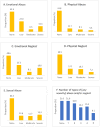Childhood Maltreatment in Patients Undergoing Bariatric Surgery: Implications for Weight Loss, Depression and Eating Behavior
- PMID: 37432188
- PMCID: PMC10181145
- DOI: 10.3390/nu15092046
Childhood Maltreatment in Patients Undergoing Bariatric Surgery: Implications for Weight Loss, Depression and Eating Behavior
Abstract
We aimed to explore the relationships between childhood maltreatment and changes in weight, depressive symptoms and eating behavior post-bariatric surgery (BS). Participants (n = 111, 85% females) were evaluated pre-surgery, and at 6 months (6 M) and 12 months (12 M) post-BS. History of maltreatment was assessed at baseline (Childhood Trauma Questionnaire), and depressive symptoms (Beck Depression Inventory-II) and eating behavior (Dutch Eating Behavior Questionnaire) were assessed at all time points. Participants' mean age and median BMI were 45.1 ± 11.7 years and 46.7 (IQR 42.4-51.9) kg/m2, respectively. Histories of emotional (EA), physical (PA) and sexual abuse (SA) and emotional (EN) and physical (PN) neglect were reported by 47.7%, 25.2%, 39.6%, 51.4% and 40.5%, respectively, with 78.4% reporting at least one form of maltreatment. Changes in weight and depressive symptoms were not different between patients with vs. without a history of maltreatment. However, those with vs. without SA demonstrated limited changes in emotional eating (EE) at 12 M, while those without showed improvements. Conversely, patients with vs. without EN showed greater improvements in external eating (ExE) at 6 M, but differences were no longer observed by 12 M. Results indicate that histories of SA and EN are associated with changes in eating behaviors post-BS and have implications for assessment, monitoring and potential intervention development.
Keywords: bariatric surgery; childhood maltreatment; depressive symptoms; eating behavior; obesity.
Conflict of interest statement
S.L.B. has served on the advisory board for Lucilab, Respiplus, Sanofi and Bayer; received an investigator-initiated educational grant from Moderna; and received consultancy and speaker fees from Respiplus, none of which are related to the current article. K.L.L. has served on the advisory board for Schering-Plough, Takeda, AbbVie, Almirall, Janssen, GSK, Astellas, Novartis, Boehringer Ingelheim (BI) and Sojecci Inc. and received sponsorship for investigator-generated research grants from GSK and AbbVie, speaker fees from GSK, AstraZeneca, Astellas, Novartis, BI, Takeda, Janssen, AbbVie, Merck, Bayer, Pfizer and Air Liquide and support for educational materials from Merck, none of which are related to the current article. All other authors have no conflict of interest to report.
Figures


Similar articles
-
Childhood maltreatment in bariatric patients and its association with postoperative weight, depressive, and eating disorder symptoms.Eat Weight Disord. 2020 Aug;25(4):999-1010. doi: 10.1007/s40519-019-00720-w. Epub 2019 Jun 1. Eat Weight Disord. 2020. PMID: 31154633
-
The impact of childhood trauma on change in depressive symptoms, eating pathology, and weight after Roux-en-Y gastric bypass.Surg Obes Relat Dis. 2019 Jul;15(7):1080-1088. doi: 10.1016/j.soard.2019.04.012. Epub 2019 Apr 17. Surg Obes Relat Dis. 2019. PMID: 31153892 Free PMC article.
-
The relationship between childhood maltreatment and problematic eating behaviors in bariatric surgery candidates.Eat Weight Disord. 2021 Jun;26(5):1357-1363. doi: 10.1007/s40519-020-00943-2. Epub 2020 Jun 13. Eat Weight Disord. 2021. PMID: 32535799
-
Childhood maltreatment in extremely obese male and female bariatric surgery candidates.Obes Res. 2005 Jan;13(1):123-30. doi: 10.1038/oby.2005.16. Obes Res. 2005. PMID: 15761171
-
The relationship between childhood maltreatment and psychopathology in adults undergoing bariatric surgery.Surg Obes Relat Dis. 2019 Feb;15(2):295-303. doi: 10.1016/j.soard.2018.11.009. Epub 2018 Nov 15. Surg Obes Relat Dis. 2019. PMID: 31010652 Free PMC article.
Cited by
-
The Association Between Childhood Trauma, Emotional Dysregulation, and Depressive Symptoms' Severity in Patients with Obesity Seeking Bariatric Surgery.J Pers Med. 2025 Jul 11;15(7):303. doi: 10.3390/jpm15070303. J Pers Med. 2025. PMID: 40710420 Free PMC article.
References
-
- WHO Child Maltreatment, Fact Sheet. 2016. [(accessed on 29 March 2023)]. Available online: https://www.who.int/news-room/fact-sheets/detail/child-maltreatment.
MeSH terms
Grants and funding
LinkOut - more resources
Full Text Sources
Medical
Research Materials

